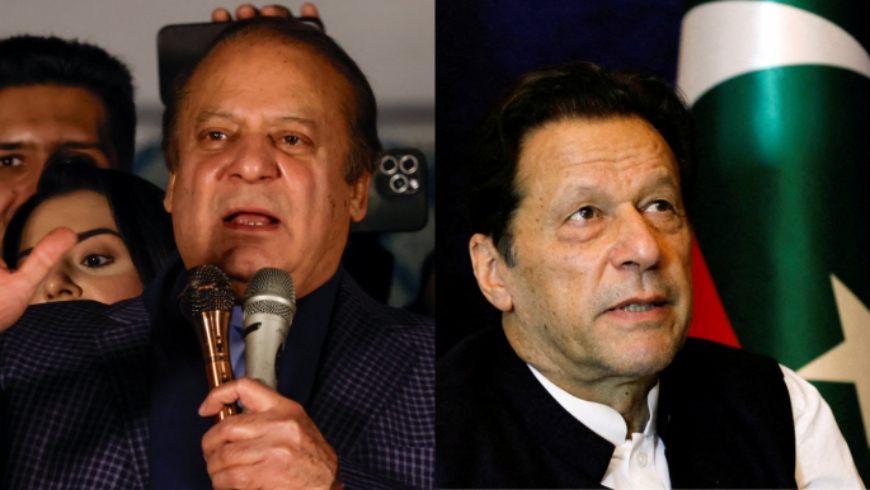Pakistan's Major Parties Formally Announce Ruling Coalition, Excluding Imran Khan
Pakistan's political landscape witnessed a significant development as Pakistan's major parties formally announce ruling coalition, excluding Imran Khan and his party. This coalition marks a pivotal moment in Pakistan's democratic journey, reshaping power dynamics and setting the stage for governance under a new leadership paradigm.
Author:Hajra ShannonReviewer:Paula M. GrahamFeb 22, 202411 Shares11.1K Views

Pakistan's political landscape witnessed a significant development as Pakistan's major parties formally announce ruling coalition, excluding Imran Khanand his party. This coalition marks a pivotal moment in Pakistan's democratic journey, reshaping power dynamics and setting the stage for governance under a new leadership paradigm.
Pakistan's major parties formally announce ruling coalition, excluding Imran Khan. The exclusion of Imran Khan and his Pakistan Tehreek-e-Insaf (PTI) party from the ruling coalition reflects a seismic shift in Pakistani politics. Despite Khan's charismatic leadership and anti-corruption rhetoric, his tenure as prime minister faced criticism over governance failures and economic challenges, leading to his political isolation.
At a press conference on Tuesday, the PMLN and PPP announced that a full agreement had been reached, more than six days after they had reached an initial agreement to form a coalition.
According to PPP chairman Bilawal Bhutto Zardaro, "the coalition's aim is to address the country's economic crisis." Shahbaz Sharif, the president of the Pakistan Muslim League and a former prime minister, promised "collective action to tackle economic and other challenges".
Late on Tuesday, the Pakistan Muslim League-Nawaz (PMLN) and the Pakistan People's Party (PPP) declared their alliance, designating Asif Ali Zardari as president and Shehbaz Sharif as prime minister.
During the press conference, Sharif stated:
“„I had offered the independent candidates to form the government first as nobody had a clear mandate; now we have the required number. It would not be an easy ride. We will work together to bring this country on the path of development and progress.- Shehbaz Sharif
The formation of a ruling coalition comprising Pakistan's major parties underscores the imperative of political consensus and collaboration in a diverse and polarized political landscape. By forging alliances across ideological divides, coalition partners aim to consolidate power, navigate complex governance issues, and address pressing national priorities.
In a stunning win for the imprisoned cricket legend, independent candidates connected to the Pakistan Tehereek-e-Insaf (PTI) party of former prime minister Khan won the most parliamentary seats.
However, none of the three main contenders secured enough seats in parliament to claim a majority. The PTI accused the PMLN and PPP of stealing their mandate to govern shortly after the coalition announcement.
Khan's party posted, saying:
Together they stole the nation’s mandate now together they’ll loot the country but the nation will not let that happen.
The PTI's cricket bat emblem, which was used on ballots to identify candidates, was eliminated, and party members' speeches were prohibited from being broadcast on television, effectively disqualifying the party from running in this month's general election. Instead, PTI members ran as independents.
In a statement released last week from prison, Khan warned against the misadventure of forming a government with stolen votes. The party also made claims of widespread poll rigging. In addition to being disrespectful to the populace, such daylight robbery will cause further declines in the nation's economy.
With Imran Khan sidelined, the ruling coalition signals a transition of power and leadership in Pakistan. As the country grapples with socio-economic challenges, including inflation, unemployment, and security threats, the coalition government faces the daunting task of restoring public trust, promoting stability, and delivering tangible improvements in citizens' lives.
Conclusion
Pakistan's major parties formally announce ruling coalition, excluding Imran Khan. The formal announcement of Pakistan's ruling coalition, excluding Imran Khan's party, marks a significant turning point in the country's political landscape.
As the coalition government assumes office, it faces the formidable task of navigating complex challenges, fostering inclusive governance, and delivering on the aspirations of the Pakistani people. By prioritizing national unity, democratic values, and socio-economic progress, the ruling coalition can chart a path toward a brighter and more prosperous future for Pakistan.
Jump to

Hajra Shannon
Author

Paula M. Graham
Reviewer
Latest Articles
Popular Articles